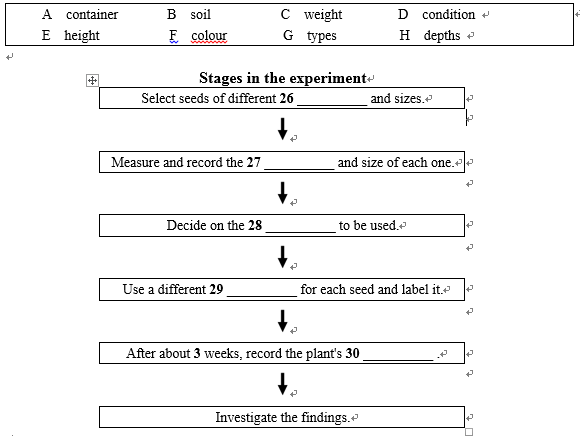2020.07.15 13:58
提到雅思备考,我们最先想到的就是剑桥雅思真题,剑桥雅思真题作为雅思备考中的热门教材,一直以来深受广大考生追捧。今天新东方在线小编就给大家整理了剑13Tset1雅思听力原文+题目+答案:Section 3,希望能都帮助大家更好的备考雅思考试,更多剑桥雅思真题原文、题目及答案解析相关内容,欢迎随时关注新东方在线雅思网。
| Test 1-Section 3 | ||
| [00:59.43 | Emma: We've got to choose a topic for our experiment, haven't we, Jack? | |
| [01:04.52 | Were you thinking of something to do with seeds? | |
| [01:07.36 | Jack: That's right. | |
| [01:09.11 | I thought we could look at seed germination - how a seed begins to grow. | |
| [01:14.30 | Emma: OK. | |
| [01:15.48 | Any particular reason? | |
| [01:17.44 | I know you're hoping to work in plant science eventually ... | |
| [01:20.73 | Jack: Yeah, but practically everything we do is going to feed into that. | |
| [01:25.33 | No, there's an optional module on seed structure and function in the third year that I might do, so I thought it might be useful for that. | |
| [01:35.79 | If I choose that option, I don't have to do a dissertation module. | |
| [01:40.83 | Emma: Good idea. | |
| [01:42.20 | Jack: Well, I thought for this experiment we could look at the relationship between seed size and the way the seeds are planted. | |
| [01:51.19 | So, we could plant different sized seeds in different ways, and see which grow best. | |
| [01:57.71 | Emma: OK. | |
| [01:59.19 | We'd need to allow time for the seeds to come up. | |
| [02:02.03 | Jack: That should be fine if we start now. | |
| [02:04.87 | A lot of the other possible experiments need quite a bit longer. | |
| [02:10.09 | Emma: So that'd make it a good one to choose. | |
| [02:13.52 | And I don't suppose it'd need much equipment; we're not doing chemical analysis or anything. | |
| [02:20.44 | Though that's not really an issue, we've got plenty of equipment in the laboratory. | |
| [02:25.60 | Jack: Yeah. | |
| [02:25.89 | We need to have a word with the tutor if we're going to go ahead with it though. | |
| [02:31.14 | I'm sure our aim's OK. | |
| [02:33.63 | It's not very ambitious but the assignment's only ten percent of our final mark, isn't it? | |
| [02:40.77 | But we need to be sure we're the only ones doing it. | |
| [02:44.87 | Emma: Yeah, it's only five percent actually, but it'd be a bit boring if everyone was doing it. | |
| [02:52.16 | Jack: Did you read that book on seed germination on our reading list? | |
| [02:56.59 | Emma: The one by Graves? | |
| [02:58.73 | I looked through it for my last experiment, though it wasn't all that relevant there. | |
| [03:04.12 | It would be for this experiment, though. | |
| [03:06.76 | I found it quite hard to follow - lots about the theory, which I hadn't expected. | |
| [03:12.69 | Jack: Yes, I'd been hoping for something more practical. | |
| [03:17.36 | It does include references to the recent findings on genetically-modified seeds, though. | |
| [03:23.20 | Emma: Yes, that was interesting. | |
| [03:25.26 | Jack: I read an article about seed germination by Lee Hall. | |
| [03:29.52 | Emma: About seeds that lie in the ground for ages and only germinate after a fire? | |
| [03:35.06 | Jack: That's the one. | |
| [03:36.64 | I knew a bit about it already, but not about this research. | |
| [03:41.78 | His analysis of figures comparing the times of the fires and the proportion of seeds that germinated was done in a lot of detail - very impressive. | |
| [03:53.01 | Emma: Was that the article with the illustrations of early stages of plant development? | |
| [03:58.79 | They were very clear. | |
| [04:00.48 | Jack: I think those diagrams were in another article. | |
| [04:45.69 | Emma: Anyway, shall we have a look at the procedure for our experiment? | |
| [04:50.01 | We'll need to get going with it quite soon. | |
| [04:52.38 | Jack: Right. | |
| [04:53.63 | So the first thing we have to do is find our seeds. | |
| [04:58.17 | I think vegetable seeds would be best. | |
| [05:01.43 | And obviously they mustn't all be the same size. | |
| [05:05.48 | So, how many sorts do we need? | |
| [05:08.64 | About four different ones? | |
| [05:10.90 | Emma: I think that would be enough. | |
| [05:12.72 | There'll be quite a large number of seeds for each one. | |
| [05:16.67 | Jack: Then, for each seed we need to find out how much it weighs, and also measure its dimensions, and we need to keep a careful record of all that. | |
| [05:27.42 | Emma: That'll be quite time-consuming. | |
| [05:30.02 | And we also need to decide how deep we're going to plant the seeds - right on the surface, a few millimetres down, or several centimetres. | |
| [05:39.25 | Jack: OK. | |
| [05:40.30 | So then we get planting. | |
| [05:42.53 | Do you think we can plant several seeds together in the same plant pot? | |
| [05:47.61 | Emma: No. | |
| [05:48.57 | I think we need a different one for each seed. | |
| [05:51.66 | Jack: Right. | |
| [05:53.52 | And we'll need to label them - we can use different coloured labels. | |
| [05:58.07 | Then we wait for the seeds to germinate - I reckon that'll be about three weeks, depending on what the weather's like. | |
| [06:06.63 | Then we see if our plants have come up, and write down how tall they've grown. | |
| [06:12.06 | Emma: Then all we have to do is look at our numbers, and see if there's any relation between them. | |
| [06:17.24 | Jack: That's right. | |
| [06:17.89 | So ... | |
翻译
| 艾玛:杰克,我们应该为我们的实验选择一个主题了,不是吗? |
| 你有考虑与种子相关的内容吗? |
| 杰克:是的。 |
| 我想我们可以观察种子的萌发——种子是如何开始生长的。 |
| 艾玛:好的。 |
| 有什么特别的原因吗? |
| 我知道你希望最后能在植物科学领域工作…… |
| 杰克:是这样的,实际上我们所做的一切都是为了实现这个。 |
| 第三年的时候我可能会上一个关于种子结构和功能的选修课。我认为它会对这门课有用。 |
| 如果我选择这门课,我就不需要写论文了。 |
| 艾玛:是个好主意。 |
| 杰克:嗯,我认为在这个实验中,我们可以看看种子大小和种子种植方式之间的关系。 |
| 因此,我们可以以不同的方式种植不同大小的种子,看看哪种方式生长得最好。 |
| 艾玛:好。 |
| 我们需要留出时间让种子萌发。 |
| 杰克:现在开始应该可以。 |
| 毕竟许多其他可能的实验会需要更长的时间。 |
| 艾玛:所以这会是一个很好的选择。 |
| 而且我认为它不需要太多设备;我们不需要做化学分析或其他事情。 |
| 虽然这并不是什么大问题,我们的实验室里有很多设备。 |
| 杰克:没错。 |
| 如果我们要继续这样做,我们需要与导师沟通一下。 |
| 我确信我们的目标没问题。 |
| 虽然它不是很宏大,但这个实验只占我们最终成绩的百分之十,不是吗? |
| 不过我们需要确保我们是唯一做这个实验的人。 |
| 艾玛:是的,实际上只有百分之五,但如果每个人都这样做这个实验,那就有点无聊了。 |
| 杰克:你在我们的阅读清单上读过那本关于种子萌发的书吗? |
| 艾玛:格雷夫斯写的那本? |
| 我做最后一次实验的时候查阅过,虽然它并不是那么相关。 |
| 但是,与这个实验是很相关的。 |
| 我发现这本书很难理解——关于理论的内容很多,这是我没想到的。 |
| 杰克:是呢,我一直希望有一些更实际的东西。 |
| 不过,它包括了一些近期转基因种子研究成果的参考文献。 |
| 艾玛:是这样的,很有意思呢。 |
| 杰克:我读了一篇李霍尔关于种子萌发的文章。 |
| 艾玛:是关于落在地上多年的种子,只有在火灾后才会发芽的那篇吗?。 |
| 杰克:就是那个。 |
| 我已经了解了一点,但不是关于这项研究。 |
| 他的数据分析非常的细致,详细对比了火灾的次数和种子发芽的比例——令人印象深刻。 |
| 艾玛:是有植物发展早期阶段图示的那篇文章吗? |
| 它们非常清晰。 |
| 杰克:我记得那些图表在另一篇文章中。 |
| 艾玛:无论如何,我们应该看一下我们实验的流程吧? |
| 很快就需要着手去做了。 |
| 杰克:对。 |
| 所以我们要做的第一件事就是找到种子。 |
| 我认为蔬菜种子最好。 |
| 自然,它们的大小不必要相同。 |
| 那么,我们需要多少种呢? |
| 大约四种不同的? |
| 艾玛:我认为这样足够了。 |
| 每个种类都会有相当大数量的种子。 |
| 杰克:接下来,对于每粒种子,我们需要测量它的重量和尺寸,并且需要仔细记录所有的数据。 |
| 艾玛:那会非常耗时。 |
| 我们还需要决定我们要把种子种在多深的地方——是种在地表,还是种几毫米深,或者几厘米深。 |
| 杰克:不错。 |
| 然后我们就可以开始种植了。 |
| 你觉得我们可以在同一个花盆里种几粒种子吗? |
| 艾玛:我觉得不可以。 |
| 我认为每粒种子都应该单独种植。 |
| 杰克:好吧。 |
| 我们需要给它们贴标签——可以使用不同颜色的标签。 |
| 然后我们就可以等待种子发芽——我估计大约需要三周,这取决于天气情况。 |
| 我们观察植物是否发芽,并记录下它们的高度。 |
| 艾玛:接下来我们所要做的就是分析我们的数据,看看它们之间是否存在关系 |
| 杰克:没错。 |
| 所以…… |
题目
SECTION 3 Questions 21-30
Questions 21-25
Choose the correct letter, A, B or C.
21 Why is Jack interested in investigating seed germination?
A He may do a module on a related topic later on.
B He wants to have a career in plant science.
C He is thinking of choosing this topic for his dissertation.
22 Jack and Emma agree the main advantage of their present experiment is that it can be
A described very easily.
B carried out inside the laboratory.
C completed in the time available.
23 What do they decide to check with their tutor?
A whether their aim is appropriate
B whether anyone else has chosen this topic
C whether the assignment contributes to their final grade
24 They agree that Graves' book on seed germination is disappointing because
A it fails to cover recent advances in seed science.
B the content is irrelevant for them.
C its focus is very theoretical.
25 What does Jack say about the article on seed germination by Lee Hall?
A The diagrams of plant development are useful.
B The analysis of seed germination statistics is thorough.
C The findings on seed germination after fires are surprising.
Questions 26-30
Complete the flow-chart below.
Choose FIVE answers from the box and write the correct letter, A-H, next to Questions 26-30.

答案
Section 3, Questions 21-30
21 A
22 C
23 B
24 C
25 B
26 G
27 C
28 H
29 A
30 E
以上就是小编为烤鸭们整理的“剑13Tset1雅思听力原文+题目+答案:Section 3”的全部内容,希望同学们能够认真学习剑桥雅思真题,早日和雅思说分手,更多剑桥雅思真题相关备考材料内容,欢迎随时关注新东方在线雅思网。

扫码添加助教号
免费获取最新雅思口语题库
